What steps can you take to avoid a stroke? Having a mother, father, or other close relative who has had a stroke makes us more susceptible to having one.
Although you can’t turn back the clock or change your family history, you can control many other stroke risk factors if you’re aware of them. Knowledge is a powerful tool. You can take steps to mitigate the effects of a risk factor that is sabotaging your health and predisposing you to a higher risk of stroke if you are aware of it.
What is a stroke?
When blood circulation to the brain fails, a stroke, also known as a “brain attack,” occurs. Reduced blood flow and the resulting lack of oxygen can cause brain cells to die. Strokes can be divided into two types: those caused by a blockage in blood flow and those caused by bleeding into the brain. Ischemic stroke, or a blockage of a blood vessel in the brain or neck, is the most common cause of stroke, accounting for about 80% of all strokes.
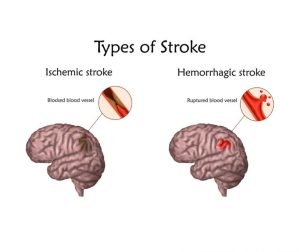
The formation of a clot within a blood vessel of the brain or neck, referred to as thrombosis; the movement of a clot from another part of the body, such as the heart, to the brain, referred to as embolism; or a severe narrowing of an artery in or leading to the brain, referred to as stenosis. The second type of stroke, hemorrhagic stroke, is caused by bleeding into the brain or the spaces surrounding the brain.
In brief, When the blood supply to a part of your brain is cut off, a stroke occurs. A clot or something else blocking the flow is the most common cause. Ischemic strokes are what they’re called. Bleeding in the brain is responsible for about 20% of the cases. Hemorrhagic strokes are what they’re called.
Top 10 Tips to Prevent Brain Stroke
✔️ Control Blood Pressure → Reduces main cause of strokes
✔️ Manage Diabetes → Prevents blood vessel damage
✔️ Quit Smoking → Lowers clot and blockage risks
✔️ Limit Alcohol Intake → Reduces high BP & irregular heartbeat
✔️ Exercise Regularly → Improves circulation & weight control
✔️ Eat a Balanced Diet → Lowers cholesterol & improves heart health
✔️ Maintain Healthy Weight → Prevents obesity-linked risk
✔️ Get Regular Health Checkups → Detects risks early
✔️ Manage Stress → Prevents BP spikes and hormonal imbalance
✔️ Follow Doctor’s Advice → Medication compliance ensures long-term safety
Prevention of a stroke:
• Lower your blood pressure
Strokes are most commonly caused by high blood pressure. For more than half of them, this is the reason. Blood pressure readings of less than 120/80 are considered normal. If yours is consistently higher than 130/80, you may have high blood pressure, also known as hypertension.
High blood pressure can make you 4-6 times more likely to have a stroke if it isn’t properly managed. This is due to the fact that it can thicken artery walls, causing cholesterol and other fats to build up and form plaques. If one of these breaks free, it can cut off the blood supply to your brain.
High blood pressure can also weaken arteries, making them more prone to burst and resulting in a hemorrhagic stroke.
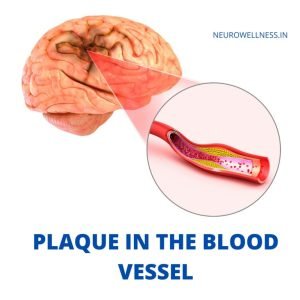
Work with your doctor to keep your blood pressure in a healthy range if you have high blood pressure. Medication and lifestyle changes, such as regular exercise and a healthy diet, may be beneficial.
• Quit smoking
If you smoke, you increase your chances of having a stroke by twofold. Cigarette smoke contains nicotine, which raises blood pressure and carbon monoxide, which reduces the amount of oxygen your blood can carry. Even inhaling second hand smoke can increase your risk of having a stroke.
Tobacco is also responsible for :
1. Increase the amount of triglycerides in your blood.
2. Reduce the amount of “good” HDL cholesterol in your body.
3. Your blood will become sticky and more likely to clot as a result.
4. Increase the likelihood of plaque formation
5. Blood vessels thicken and narrow, causing damage to their linings.
6. Consult your doctor about quitting smoking. Nicotine patches and counselling may be of assistance. If you don’t succeed the first time, don’t give up.
• Manage your heart
Some strokes are caused by blood clots and are caused by an irregular heartbeat called atrial fibrillation (AFib). AFib causes blood to pool in your heart, posing a clotting risk. If that clot travels to your brain, it can cause a stroke. You can have AFib because of high blood pressure, plaques in your arteries, heart failure, and other reasons.
Your heart can be put back into a normal rhythm with the help of medications, medical procedures, and surgery. Consult your doctor if you’re not sure if you have AFib but are experiencing heart flutters or shortness of breath.
• Control your diabetes
A stroke is 2-4 times more likely if your blood sugar is high. Diabetes can cause fatty deposits or clots in your blood vessels if it isn’t properly managed. This can narrow the ones in your brain and neck, potentially cutting off the brain’s blood supply.
If you have diabetes, make sure to check your blood sugar levels on a regular basis, take your medications as directed, and visit your doctor every few months so they can monitor your levels.
• Exercise
A sedentary lifestyle can lead to obesity, high cholesterol, diabetes, and high blood pressure, all of which are risk factors for stroke. So get to work. You are not required to run a marathon. It is sufficient to exercise for 30 minutes five days a week. Before you begin exercising, consult your doctor.
• Get proper diet
Healthy eating can help you lose weight and reduce your risk of having a stroke. Every day, eat plenty of fresh fruits and vegetables (broccoli, Brussel sprouts, and leafy greens like spinach are ideal). Choose foods that are high in fibre and lean proteins. Trans and saturated fats can clog your arteries, so avoid them. Reduce your salt intake and stay away from processed foods. They’re frequently high in salt and trans fats, both of which can raise blood pressure.
•Medications
Blood thinners are advised in medical conditions like stent in heart and neck vessels(angioplasty) and after bypass surgery of heart etc. You may be advised to manage blood parameters correctly. Blood thinners are like double edged sword. If you don’t take correctly also cause problem, if you won’t take/manage blood parameters properly also causes problem. Please follow doctors advise correctly – helps in stroke prevention.
Summary:
Neuro Wellness spine and brain care centre does Advanced Stroke treatment in Bangalore with the best care. The specialists ensure cost effective and efficient treatment.
Stroke Prevention Clinic in Bangalore
“Prevent stroke before it happens. Neurowellness Brain & Spine Clinic offers personalized risk assessment, prevention guidance, and advanced care.”

Dr. Ganesh Veerabhadraiah
Consultant – Neurosurgeon, Neurointerventional Surgery, Spine Surgeon (Neuro)
23+ Years Experience Overall (17+ years as Neuro Specialist)
Available for Consultation: Jayanagar 9th Block & Kauvery Hospital, Electronic City
FAQs
1. Can brain strokes be prevented naturally?
Yes. Lifestyle changes such as a healthy diet, exercise, and stress management help reduce stroke risk.
2. What foods help prevent stroke?
Fruits, vegetables, whole grains, nuts, and foods low in salt and trans fat support brain and heart health.
3. How does exercise reduce stroke risk?
Regular activity improves blood flow, controls BP, reduces cholesterol, and supports healthy weight.
4. Who is most at risk of brain stroke?
People with hypertension, diabetes, smoking habits, obesity, or family history of stroke.
5. Where can I get stroke prevention advice in Bangalore?
Neurowellness Brain & Spine Clinic provides stroke risk assessment and prevention guidance.

About Author
Dr. Ganesh Veerabhadraiah
Dr. Ganesh Veerabhadraiah, leading neurosurgeon and neurologist in Bangalore, has over 20 years of expertise in managing back pain, migraines, headaches, neuro disorders, and spine problems. His clinical excellence and patient-first approach make him one of the most trusted neuro doctors in Bangalore.
At Neurowellness Brain & Spine Clinic in Jayanagar and Kavery Hospital Electronic City, Dr. Ganesh provides comprehensive treatments ranging from minimally invasive spine surgery to advanced neurological care. As a respected back pain specialist and migraine doctor, he continues to deliver reliable outcomes for patients.
👉 Connect with Dr. Ganesh on LinkedIn

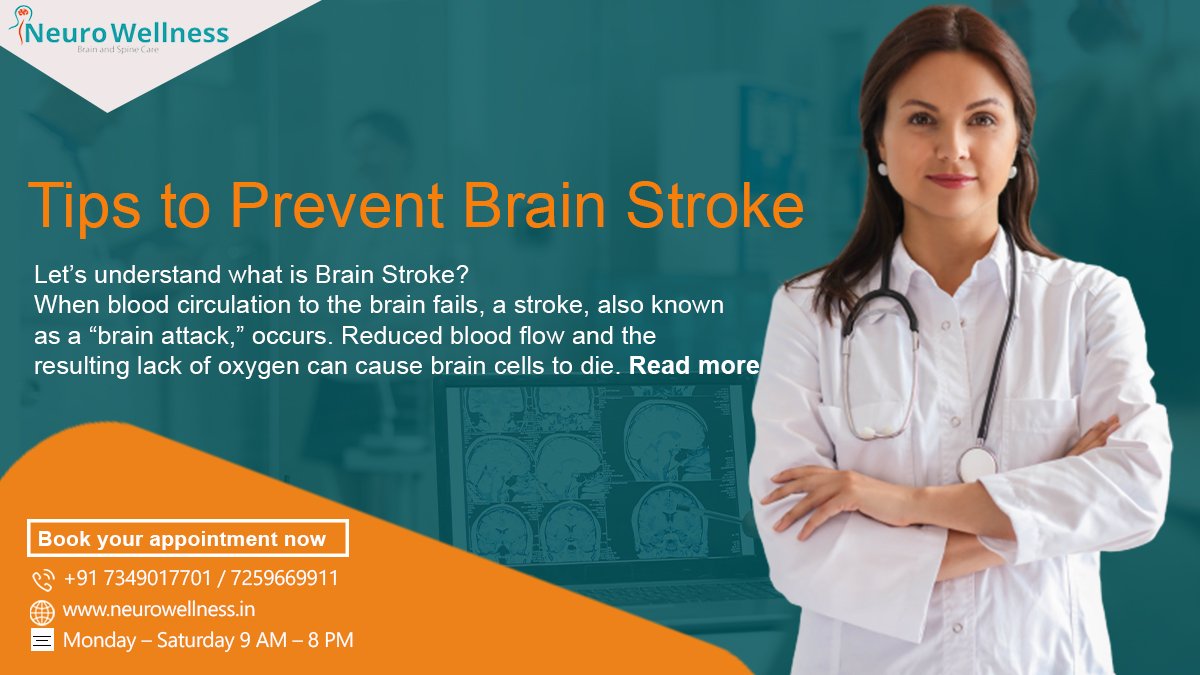

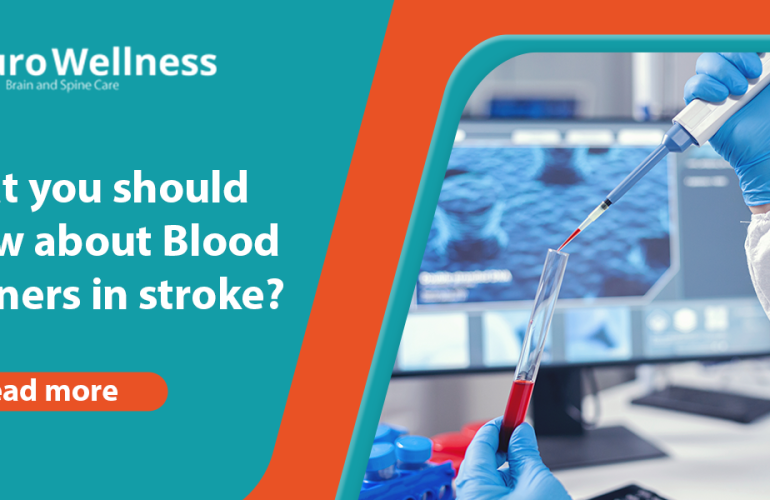
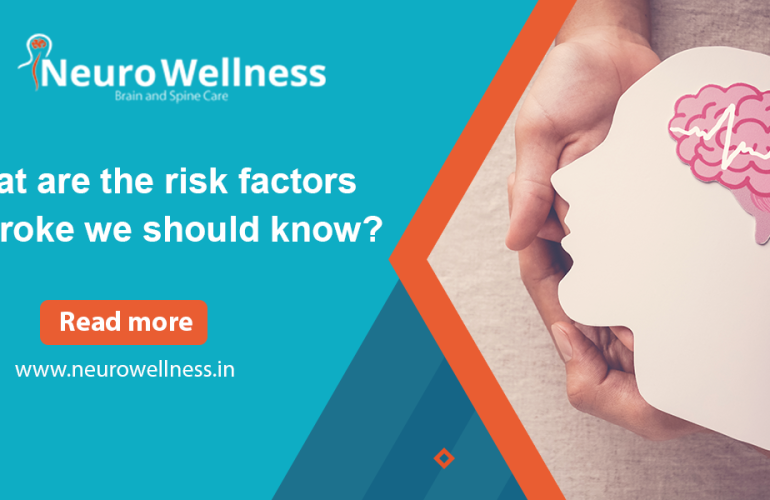
Comments are closed.